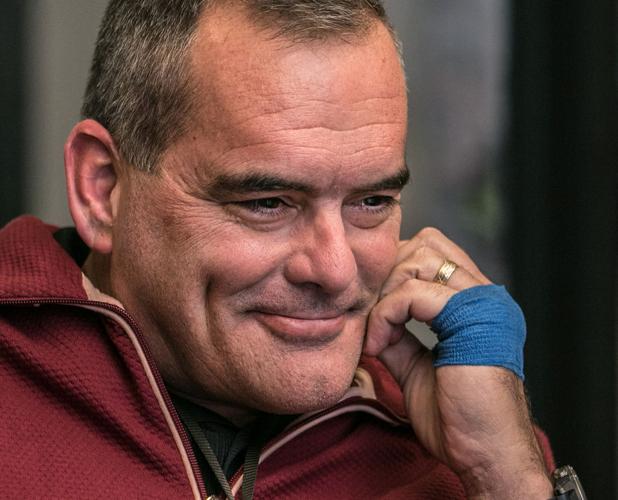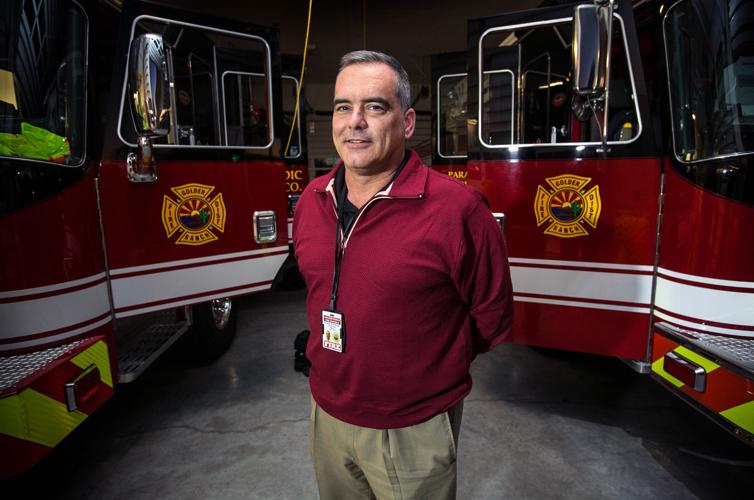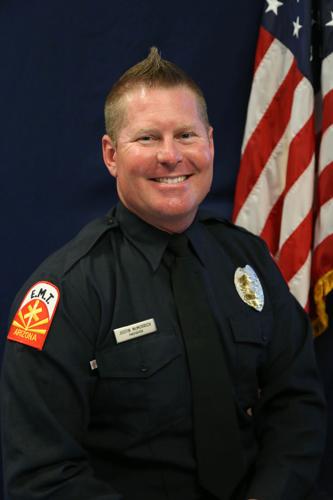Two Golder Ranch Fire District firefighters are battling cancer and their journey has brought the men closer together as they lean on each other for support while their comrades help them and their families.
Tom Brandhuber, assistant chief of operations, and Justin McMurrich, a firefighter and emergency medical technician, both say they want their comrades to stay healthy while cancer prevention studies strive to improve safety equipment and techniques for protecting firefighters.
Brandhuber was a strong, healthy firefighter for 29 years — the last four working for Golder Ranch on the northwest side. His firefighting career includes stints in the Air Force and 15 years with Rural Metro.
In April, he began suffering painful spinal compression fractures. Once he was traveling by plane, and when the plane landed, Brandhuber said, he suffered three fractured vertebrae. Another time, he bent over to pick up a pen and fractured two ribs.
Doctors were baffled until after the third break, when he was diagnosed with multiple myeloma, cancer of a white blood cell called a plasma cell. The plasma cells accumulate in the bone marrow and crowd out healthy blood cells, making the bones weak, explained Brandhuber, 48.
He suffered a total of 14 fractures in his back and has undergone two surgeries in which bones were fused. Most of the fractures are healed now and he no longer wears a harness, nor does he need a wheelchair, walker or cane. Brandhuber has regained some strength and now can carry a carafe of water to make coffee — something he couldn’t do when he was at his weakest.
He also can drive, and when he could not, fellow firefighters would drive him everywhere, including to work and medical appointments.
The firefighting community checks in on the families of Brandhuber and McMurrich. They do errands and even yard work. The North Tucson Firefighters Association Local 3832 recently held a car wash to help the families and raised nearly $7,000.
The firefighters’ comrades went shopping with McMurrich’s three children recently while Justin, 43, and his wife, Katie, 41, remain at the University of Texas MD Anderson Cancer Center in Houston, where Justin is undergoing treatment for peripheral nerve sheath sarcoma, a cancer of the connective tissue surrounding nerves. He had surgery Dec. 7 to remove a malignant tumor affecting the nerve canal in his jaw.
Since April, Brandhuber has received chemotherapy infusions and also takes the drug orally. He attends physical therapy to build back his strength. Once the cancer is in remission, he will undergo a stem-cell transplant at the Mayo Clinic in Phoenix.
“I have my good days and my bad days,” said Brandhuber, who oversees firefighting personnel, emergency medical services, training and special response teams for the district. The district has a $28 million annual budget and 190 firefighters who service 241 square miles with a population of 140,000.
“I am very blessed to work for Golder Ranch,” said the assistant chief, explaining that his bosses allow him to be flexible with his work schedule. He comes to the office when he feels well and stays home when he does not.
“We all face challenges in life and we have to work to overcome those challenges,” said Brandhuber, who shows up to work more often than not. He became a firefighter because he wanted to help those in need and give back to his community, a value taught to him by his parents and strengthened by his military service.
He said he finds strength to remain positive and not give up on life from his Catholic faith and his family, especially his wife, Tamara, 47, who he described as a “rock star” in keeping the family together. His wife, a physical education and health teacher at Catalina Foothills High School, is there for him and their four daughters.
“The most difficult for me was telling the kids,” said Brandhuber, who is receiving treatment through Arizona Oncology. “I want to make sure I will be there for my kids as they grow up. My cancer is not a curable cancer — it is a treatable cancer. I am buying as much time as I can.
“It is what it is, and if cancer doesn’t change who I am or how I treat people, then cancer can’t win. Being angry and upset won’t change it. It just makes it harder to deal with.
“I am at peace. I have a belief that God has a plan, regardless of the outcome. I am at peace with whatever God’s plan is.”
However, Brandhuber said, “I will fight like hell and keep a positive mind-set to face the difficulties.”
He said he looks forward to the day he can clean his yard, lift weights, run and regain his independence.
Meanwhile, he and McMurrich talk three times a week.
McMurrich said, “I have known Tom for 15 years, and he has been going through this (cancer treatment) for a while. I get a lot of my support from him. He is so determined. He is a warrior. When we talk, he is very uplifting. He keeps me on the positive side of things.”
McMurrich became fatigued and felt pain in his jaw during the interview, so he let his wife, Katie, do the talking for him.
McMurrich, a firefighter and emergency medical technician, began his career in 2002 with the Avra Valley Fire District and has also worked for Rural Metro and Mountain Vista.
He was diagnosed in October with cancer after going to doctors for more than a year and not finding answers, said Katie McMurrich, an insurance agent.
“It was very frustrating because we knew something was wrong,” she said.
Doctors could not provide answers to why her husband had a patch of numb skin on his left jaw. After seeing five doctors and undergoing two MRIs over five months, one doctor realized that a tumor was overlooked in one of the MRIs, Katie said.
“It was agonizing when months went by and he was not getting any better, and he was in pain and the meds were not working,” she recalled. “I wanted answers, so I started advocating for him and went with him to his appointments.”
By the time the rare cancer was detected, it had traveled from his left jawbone to below his left ear. The couple left Tucson Nov. 26 for the Houston cancer center and readied for the operation in which surgeons removed Justin’s lymph nodes, cut out his jawbone from his canine teeth to below his ear. Doctors reconstructed the jaw by using a piece of his right fibula.
Katie fainted when she saw her husband after surgery with breathing, feeding and drainage tubes.
“He could not talk and he was learning how to breathe. I was holding his hand in recovery and the next thing I knew all the nurses were around me,” she recalled. “I was very emotional and anxious.”
Justin’s healing began quickly, surprising doctors when he talked the second day after surgery despite the swelling. All the tubes were removed in a week, but he cannot eat solid foods for months. The couple received housing at the Houston Rotary Fire Fighters Home when he was released.
He remains in Houston for treatment and in mid-January faces the possibility of both radiation and chemotherapy.
“It has been a heck of a ride,” said Justin, who FaceTimes on the computer daily with his three children. The former professional motocross racer also hears from friends in the racing world, and from Tucson and Houston firefighters.
“The most difficult was accepting and processing that I have cancer. Now I am fighting cancer. It will be a long road. I want to grow old with my wife and watch my kids grow up. I want to see my kids have kids. I want to be a grandpa. I am not going to accept death in my 40s,” he said.
Cancer is among a leading causes of death for firefighters, said Mike McKendrick, chairman of the Greater Tucson Fire Foundation. The nonprofit, founded by firefighters, raises funds to provide advanced training and health and wellness support for Southern Arizona firefighters.
The University of Arizona, in conjunction with the Tucson Fire Department, is in the midst of a three-year study funded by the Federal Emergency Management Agency to reduce cancer among firefighters.
Researchers are studying firefighters’ exposure to carcinogens through the skin and via the inhalation of smoke, diesel exhaust and other chemical gases, vapors and particulates.
“You know as a firefighter that you will run a higher risk in developing a type of cancer. It is one of the inherent dangers of the job,” said Brandhuber.
He said fire departments are working to reduce firefighters’ exposure to cancer-causing agents.







